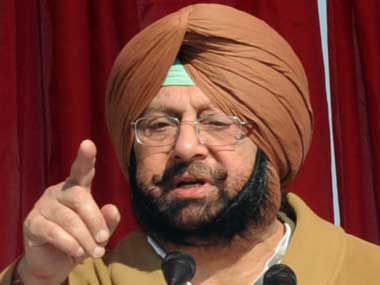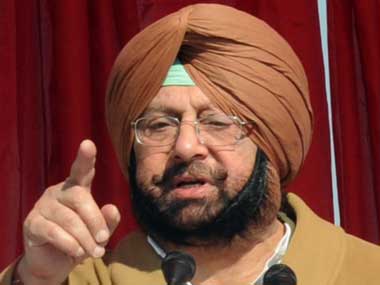by RK Raghavan There is a
war of words
going on between Punjab Congress chief Capt Amarinder Singh and the State’s DGP Sumedh Saini. The former had questioned the integrity of police investigations into the abduction of a minor girl of Sialkot, and the police head rightly took exception to it. Each has asked the other to mind his own business. While Amarinder says the DGP should not transgress into what is the politician’s preserve, the latter tells the former Chief Minister that policing is an expert’s area and they need not be told how to conduct their business. Both are unexceptionable stands. The public impression, however, that is neither has covered himself with glory by going to town with their exchanges. In my view it would be preposterous to try and explore who was at fault. The politician-police relationship is sensitive and too complex to make any assertion on such episodes. Each of these gentlemen was possibly doing what he considered his duty was. What incenses me, however, is the Congress leader’s accusation that Saini was acting as if he belonged to the ruling party. I do not know either of them. Their mutual recrimination does not enhance the quality of policing, and the sufferer is the honest citizen who demands objective and swift response to his needs from the police. But then this is at its worst a very mild clash of egos. There are worse tales from other parts of the country where the police have been squarely accused by the Opposition of crass politics in their day-to-day activities and a despicable bending over backwards to please the ruling party. This alleged cronyism is real and is becoming more and more blatant in spite of an intense media scrutiny of the political scene and public agencies like the police whose effectiveness is getting diluted each day. [caption id=“attachment_509218” align=“alignleft” width=“380”]
 Punjab Congress chief Capt Amarinder Singh. AFP[/caption] I am surprised that the community has not risen to a man to check this alarming trend in the interest of building a service-oriented and impartial police on whom the poorest of citizens can depend in a crisis. Many of us have written frequently on this sordid state of affairs and pleaded ad nauseam for a professional relationship between the polity and the police. Nothing seems to have changed. This is because there is an attitude of resignation on the part of the Indian consumer, who believes that he can always buy police assistance whenever he wants it after bribing the service provider. Nothing can be more obnoxious. This is a drift, which, if left unchecked, could make policing a commercial proposition, a service that is available only to the highest bidder. The impression already all over the country is that without paying a bribe a victim cannot get his complaint registered in any police station. This is a mockery of our Constitution which upholds the right of every citizen to life and property. The police leadership has to take a major share of the blame for this depressing situation. A large number of senior officers themselves have a lot to be defensive about in their lives and this is the reason why they hardly do anything to check graft among their subordinates. Many of them crave ‘lucrative’ postings just as many political parties demand and secure ‘lucrative’ portfolios in government. No conduct rule can take the police out of this rut. What is needed is a new culture that would make every IPS officer resolve not to clamour for a particular job and place himself under obligation to the ruling party. This culture can be engendered and fostered only at the National Police Academy (NPA) and not elsewhere. Such indoctrination no doubt usually wears off when an officer, at the end of his training, gets into the jungle of a state police force where the temptations are too many and supervisory control is light or nearly non-existent. There is a strong case for the stepping up of the current effort by the NPA in this direction. I would accord the utmost priority to this sacred task. Training in professional tasks comes only next. This is saying the most obvious and may sound perfunctory. But then such routine preaching does a world of good and converts at least a few of the delinquents into mending their ways. What do we do with the polity? I believe that the average politician and the policeman distrust each other so much that there is an underlying animosity. This has to change. A relationship of trust and respect is built not by keeping the two apart. Insularity is welcome but should not become a fetish and obsession. It is not only the NPA but state police academies should also provide for an opportunity for healthy interaction. It is my experience that many a time if the politician is told how a particular demand, extra-legal or illegal, cannot be acceded to, he understands and yields, though often grudgingly. I know I can be accused of simplifying a complex web of relationships. I cannot think of an alternative. Down-to-earth lectures in the local language to state legislators on the fundamentals of criminal law and procedure and provisions of the police manual will considerably help in promoting an understanding between two groups, who are currently at war in many places. If such exercises are institutionalised, the spat that took place recently between Amarinder Singh and Saini could in all probability have been avoided. The author is a former CBI director.
Punjab Congress chief Capt Amarinder Singh. AFP[/caption] I am surprised that the community has not risen to a man to check this alarming trend in the interest of building a service-oriented and impartial police on whom the poorest of citizens can depend in a crisis. Many of us have written frequently on this sordid state of affairs and pleaded ad nauseam for a professional relationship between the polity and the police. Nothing seems to have changed. This is because there is an attitude of resignation on the part of the Indian consumer, who believes that he can always buy police assistance whenever he wants it after bribing the service provider. Nothing can be more obnoxious. This is a drift, which, if left unchecked, could make policing a commercial proposition, a service that is available only to the highest bidder. The impression already all over the country is that without paying a bribe a victim cannot get his complaint registered in any police station. This is a mockery of our Constitution which upholds the right of every citizen to life and property. The police leadership has to take a major share of the blame for this depressing situation. A large number of senior officers themselves have a lot to be defensive about in their lives and this is the reason why they hardly do anything to check graft among their subordinates. Many of them crave ‘lucrative’ postings just as many political parties demand and secure ‘lucrative’ portfolios in government. No conduct rule can take the police out of this rut. What is needed is a new culture that would make every IPS officer resolve not to clamour for a particular job and place himself under obligation to the ruling party. This culture can be engendered and fostered only at the National Police Academy (NPA) and not elsewhere. Such indoctrination no doubt usually wears off when an officer, at the end of his training, gets into the jungle of a state police force where the temptations are too many and supervisory control is light or nearly non-existent. There is a strong case for the stepping up of the current effort by the NPA in this direction. I would accord the utmost priority to this sacred task. Training in professional tasks comes only next. This is saying the most obvious and may sound perfunctory. But then such routine preaching does a world of good and converts at least a few of the delinquents into mending their ways. What do we do with the polity? I believe that the average politician and the policeman distrust each other so much that there is an underlying animosity. This has to change. A relationship of trust and respect is built not by keeping the two apart. Insularity is welcome but should not become a fetish and obsession. It is not only the NPA but state police academies should also provide for an opportunity for healthy interaction. It is my experience that many a time if the politician is told how a particular demand, extra-legal or illegal, cannot be acceded to, he understands and yields, though often grudgingly. I know I can be accused of simplifying a complex web of relationships. I cannot think of an alternative. Down-to-earth lectures in the local language to state legislators on the fundamentals of criminal law and procedure and provisions of the police manual will considerably help in promoting an understanding between two groups, who are currently at war in many places. If such exercises are institutionalised, the spat that took place recently between Amarinder Singh and Saini could in all probability have been avoided. The author is a former CBI director.
Punjab DGP vs Amrinder: Tu-tu, main-main doesn't help
FP Archives
• October 31, 2012, 12:12:03 IST
The police are often playing second fiddle to politicians and losing the trust of the people. The rot needs to be arrested.
Advertisement
)